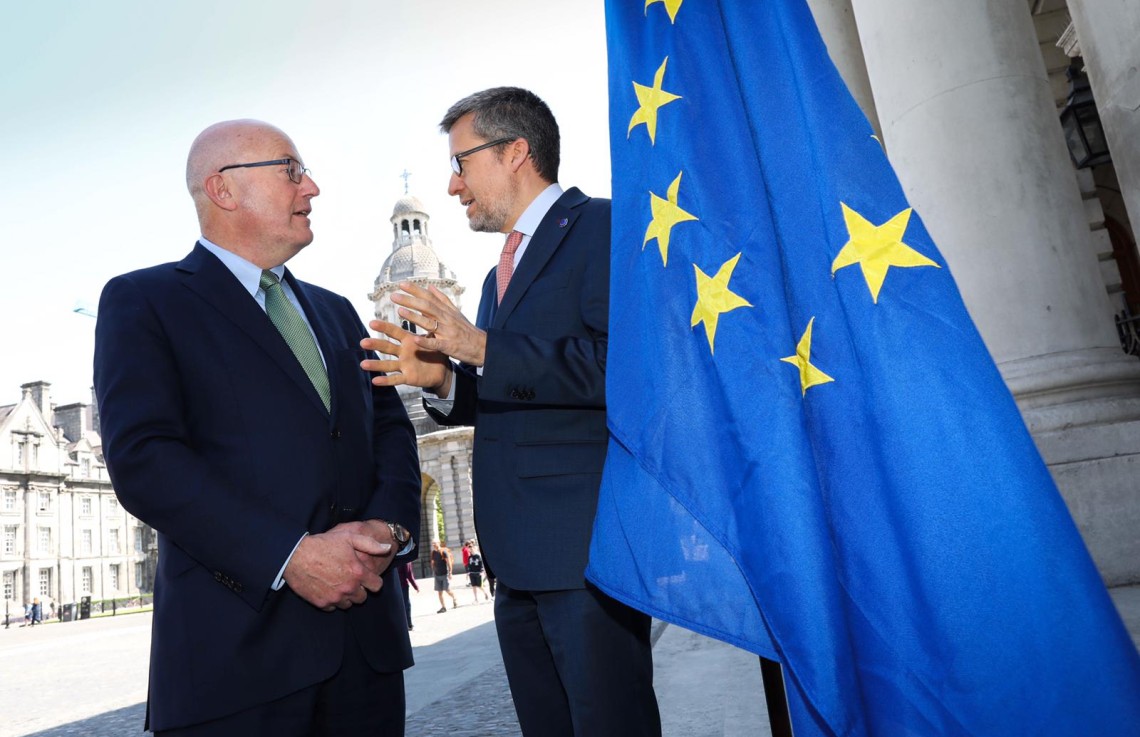Ireland’s Chief Scientific Advisor believes fossil fuels still have a role in a low-carbon future – and there is money to be made ensuring it.
Late last year, Professor Mark Ferguson, a medical doctor and dentist with no Earth science qualifications, provoked a controversy in addressing Ireland’s parliamentary committee on climate action, when he stated: “as a scientist, I am optimistic. Climate change is a big problem and a big issue but I remind you that no crisis that was ever predicted in human history has come to pass”.
In an interview this week with Desmog, Ferguson defended these comments, adding: “there is, of course a crisis and I acknowledge that, but you need to give people hope that they can do something about it. If you overwhelm people and say, this is a terrible crisis, and there’s nothing to do, then you’re unlikely to get the mitigation action that you want, and you’re very unlikely to get people to respond in terms of doing what’s required”.
Asked about his comments to the parliamentary committee defending continued fossil fuel burning, he stressed that he was “talking about carbon capture (CCSCO2”.
When pressed on whether he thought wide-scale CCS could ever be economically or technically feasible, given decades of false starts, Ferguson appeared unclear, replying: “we need to encourage significant research in this area”.
While Ireland has completely missed its 2020 EU carbon reductions targets, Ferguson stated that the government’s new Climate Action Plan was designed to address this. When asked if he believed this plan could get Ireland on track for its 2030 targets, he replied: “I have not done the numbers”.
He declined to discuss the specifics of government climate policy with Desmog, stating: “if you want to talk about policy, you should talk to the people in the department and with the experts in that area; I am not going to say anything about any individual piece because I’m not well briefed or well qualified to do so”.
Individual change not system change
Ferguson believes that effective climate action is about small steps taken by individuals as well as technological solutions, with the need for policy changes rarely discussed in any detail. In a recent RTE radio interview, Ferguson focused instead on what he saw as the money-making potential in climate change: “there are whole new industries that will do good for the planet and actually make money for people”.
Ferguson’s views appear to closely echo the general luke-warmist approach of the Irish government on climate action, with Taoiseach, Leo Varadkar keen to talk up personal actions but notably reluctant to press for changes that would discomfit politically powerful lobby groups such as the agri-industrial sector, whose emissions continue to spiral.
Varadkar recently controversially spoke of the possible upsides of climate change, such as fewer deaths from cold during the winter. Comments he later clarified, acknowledging they could be subject to “misinterpretation by those who may be pursuing a climate sceptic agenda”.
Asked to comment, Ferguson stated: “I think what the Taoiseach was trying to do was to try and provide some encouragement to people. I understand why that is, because there are quite a lot of studies that talk about climate anxiety, people are kind of paralysed, they feel they can’t do anything about it”.
Holding the purse strings
In addition to his role as science adviser to the government, Ferguson also heads Science Foundation Ireland (SFI), the grant-giving body that dispenses some €170 million in research funding annually. Since taking over this role in 2012, Ferguson has shifted SFI’s focus to largely supporting research funding that is likely to make a profit.
Ferguson spent much of his career at the University of Manchester, from where he set up a private biopharmaceutical company, Renovo, to commercialise his research. However, having raised and spent over €100 million, the company failed and all investor funding, including £20 million of UK taxpayer’s money, was lost. However, Ferguson and his wife made over €12 million in exercising share options when shares peaked in 2007. Ferguson also received over €4.5 million in salary while heading Renovo.
When questioned in 2012 as to his suitability to head up Ireland’s grant-giving science agency, given the Renovo fiasco he spearheaded, Ferguson replied: “lots of others involved sold shares and lots of investors made hundreds of millions. I wasn’t the only one who made money”.
Ferguson isn’t the only figure with a chequered financial history ready to suggest the most economically optimal path to a low-carbon society. Hereditary peer, advisor to the UK climate science denial campaign group the Global Warming Policy Foundation, and former Northern Rock chairman Matt Ridley is similarly ready to ignore his fiduciary failings when pushing his ‘optimistic’ view of technological solutions to the climate crisis. The collapse of the Northern Rock bank in 2007 marked the starting point of a prolonged financial crisis.
The government’s decision to allow Ferguson to fill the dual roles of heading SFI while also government chief scientific adviser was criticised at the time by a number of senior scientists, who pointed out the likely conflict of interest that would arise. “We are now in a situation where a person holding the purse strings to science is giving the government advice on how it is funded”, according to Prof James McInerney of NUI Maynooth.
Prof Stefano Sanvito of Trinity College, Dublin warned that the most likely outcome of the appointment is that Ireland will effectively no longer have a Chief Scientific Adviser. Asked by Desmog if he felt it was appropriate that he holds the two positions, Ferguson replied: “Absolutely; as I said before, I do not give personal scientific advice … I clearly cannot be an expert in everything. I seek out the experts and introduce them to those seeking advice”.
Image credit: Science Foundation Ireland
Subscribe to our newsletter
Stay up to date with DeSmog news and alerts






